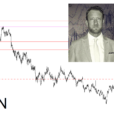
Indexing your investments is a good way to increase your chances of doing better than average. Most active investors trying to pick winning stocks (and avoid losing ones) don’t beat the index. Those who do are hard to identify ahead of time. Once you think you’ve identified a market-beating manager, they often allow their fund to get too big, which typically reduces their chances of repeating their past success. And sometimes they’re on the cusp of retirement. Or they’ve lost analysts who’ve helped them be great. In other instances, you might be correct in thinking they can outperform over the long term, but you’re about to capture one of their fallow periods. Nobody ever said this game was easy.
Yet, there are problems with indexing too. “Indexing” generally means following what’s called a “capitalization weighted” index. That means the rank of the stock in the index is determined by how much the stock market values it. Market capitalization is the total shares of a stock outstanding multiplied by the price per share. But is taking the stock market’s verdict about where a stock should be ranked in an index reasonable? Many people think it isn’t. After all, you necessarily own more shares of the most favored and possibly expensive stocks in a capitalization weighted index.
When the first index fund – the Vanguard 500 Index Fund – came to the market in the early 1970s, academic finance was dominated by the notion that the market prices stocks properly – or accurately, based on available information – at all times. That made it seem reasonable to rank stocks by how the stock market says they should be ranked.
But there’s a case to be made that ranking stocks based on their underlying companies’ economic fundamentals such as sales, earnings, dividends, and book value might also be reasonable. And if stock markets don’t always set prices properly, if they are sometimes the victims of emotion gripping their participants, maybe focusing on economic fundamentals of the businesses is a smarter approach to indexing. And, after all, if you rank stocks based on companies’ underlying economic fundamentals, you’re arguably not showing any disrespect for markets. You might just be elevating the markets for companies’ goods and services over the market that trades those companies’ stocks.















No Comments